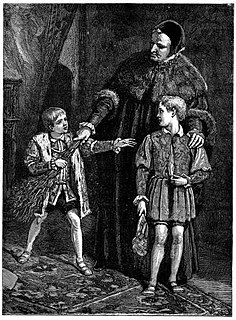 W
WAunt Sally is a traditional English game usually played in pub gardens and fairgrounds, in which players throw sticks or battens at a ball, known as a 'dolly', balanced on top of a stick, traditionally a model of an old woman's head was sometimes used. Leagues of pub teams still play the game today, throughout the spring and summer months, mainly in Oxfordshire and some bordering counties. In France, the game is called jeu de massacre.
 W
WThe Cassandra metaphor relates to a person whose valid warnings or concerns are disbelieved by others.
 W
WA Hobson's choice is a free choice in which only one thing is actually offered. The term is often used to describe an illusion that multiple choices are available. The most well known Hobson's choice is "I'll give you a choice: take it or leave it", wherein "leaving it" is strongly undesirable.
 W
WThe Judgement of Solomon is a story from the Hebrew Bible in which Solomon ruled between two women both claiming to be the mother of a child. Solomon revealed their true feelings and relationship to the child by suggesting the baby be cut in two, each woman to receive half. With this strategy, he was able to discern the non-mother as the woman who entirely approved of this proposal, while the actual mother begged that the sword might be sheathed and the child committed to the care of her rival. Some consider this approach to justice an archetypal example of an impartial judge displaying wisdom in making a ruling.
 W
WNigger in the woodpile or nigger in the fence is a figure of speech originating in the United States meaning "some fact of considerable importance that is not disclosed—something suspicious or wrong".
 W
W"O Captain! My Captain!" is an extended metaphor poem written by Walt Whitman in 1865 about the death of U.S. president Abraham Lincoln. Well received upon publication, the poem was Whitman's first to be anthologized and the most popular during his lifetime. Together with "When Lilacs Last in the Dooryard Bloom'd", "Hush'd Be the Camps To-day", and "This Dust was Once the Man", it is one of four poems written by Whitman about the death of Lincoln.
 W
WA poster child is, according to the original meaning of the term, a child afflicted by some disease or deformity whose picture is used on posters or other media as part of a campaign to raise money or enlist volunteers for a cause or organization. Such campaigns may be part of an annual effort or event, and may include the name and age of a specific child along with other personally identifiable attributes.
 W
WIn Greek mythology, Procrustes, also known as Prokoptas or Damastes, was a rogue smith and bandit from Attica who attacked people by stretching them or cutting off their legs, so as to force them to fit the size of an iron bed.
 W
WSkeleton in the closet or skeleton in the cupboard is a colloquial phrase and idiom used to describe an undisclosed fact about someone which, if revealed, would damage perceptions of the person; It evokes the idea of someone having had a human corpse concealed in their home so long that all its flesh had decomposed to the bone. "Cupboard" may be used in British English instead of the American English word "closet". It is known to have been used as a phrase, at least as early as November 1816, in the monthly British journal The Eclectic Review, page 468. It is listed in both the Oxford English Dictionary, and Webster's Dictionary, under the word "skeleton". The "Cambridge Academic Content Dictionary" lists it under this but also as a separate idiom. In the most derisive of usage, murder, or significant culpability in a years-old disappearance or non-understood event, may be implied by the phrase.
 W
WA whipping boy was a boy educated alongside a prince in early modern Europe, who received corporal punishment for the prince's transgressions in his presence. The prince was not punished himself because his royal status exceeded that of his tutor; seeing a friend punished would provide an equivalent motivation not to repeat the offence. An archaic proverb which captures a similar idea is "to beat a dog before a lion." Whipping was a common punishment of tutors at that time. There is little contemporary evidence for the existence of whipping boys, and evidence that some princes were indeed whipped by their tutors, although Nicholas Orme suggests that nobles might have been beaten less often than other pupils. Some historians regard whipping boys as entirely mythical; others suggest they applied only in the case of a boy king, protected by divine right, and not to mere princes.